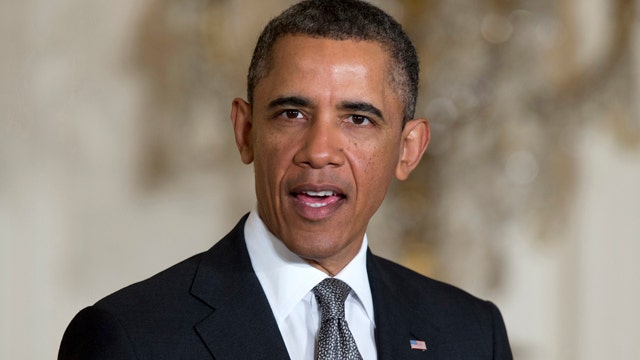Bias Bash: Doom and gloom campaign over sequester?
Cal Thomas on the media coverage of spending cuts
The boiling hysteria of the last few weeks over automatic spending cuts has reduced to a simmer now that they've technically taken effect, and one thing is clear -- the cuts, in some form or another, are likely here to stay.
The White House has eased off its dire predictions, with economic adviser Gene Sperling on Sunday calling the impact more of a "slow grind" than an economic doomsday.
And Republican leaders sounded mildly satisfied that, while the nature of the cuts is not ideal, they were able to ensure Washington did not pass another stopgap -- which President Obama called for in the weeks leading up to last Friday's deadline.
Senate Republican Leader Mitch McConnell, R-Ky., suggested the cuts would be manageable.
"This modest reduction of 2.4 percent in spending over the next six months is a little more than the average American experienced just two months ago, when their own pay went down when the payroll tax holiday expired," McConnell said.
House Speaker John Boehner, on NBC's "Meet the Press," conceded he simply couldn't predict the impact. "I don't know whether it's going to hurt the economy or not," Boehner said. "I don't think anyone quite understands how the sequester is really going to work."
While the cuts represent just more than 2 percent of the federal budget, they only target a relatively narrow portion of that budget. When that is taken into account, the administration says the cuts really represent 9 percent of the non-defense budget and 13 percent of defense spending.
Some top Republicans, including Sen. John McCain, R-Ariz., continue to press for changes to shield the military from drastic cutbacks. The Pentagon for months has warned that the sequester will damage military readiness.
Lawmakers on both sides can still come together on an agreement to target the cuts more carefully. Republicans, though, have insisted throughout that they will not allow for any revenue increases, something Democrats demand -- and it's unclear whether the two sides will bridge that gap, as Congress moves next into negotiations over a budget measure that expires at the end of the month. But the prospect of deactivating the cuts altogether, an option some Democrats called for in the final throes of sequester panic, appears to be fading.
The $85 billion in cuts apply to the remainder of the 2013 fiscal year, which ends Sept. 30. But without a deal they will continue slashing government spending by about $1 trillion more over a 10-year period.
Sperling, on NBC's "Meet the Press," declined at least twice to directly answer questions about whether the worst-case-scenario rhetoric has hurt the president's credibility on the issue. He instead stuck to his argument that independent economists forecast the cuts will result in 750,000 fewer jobs and that corporate executives now anticipate slower economic growth.
Congress agreed to the cuts, known as sequester, in 2011 after failing to agree on more measured reductions -- to defense and some domestic spending. However, the cuts were intended to be so drastic that Democrats and Republicans would be forced to compromise before they started. They didn't.
Sperling on Sunday rejected several Republican-backed plans and said no compromise would be reached unless the party agrees to tax increases.
Sen. Kelly Ayotte, R-N.H., responded by saying Congress agreed to such increases in January "at the president's request" and questioned why Obama and other Democrats will not agree to additional spending cuts.
She argued for potential pay freezes for federal employees and reforms to the federal food stamps program.
"There's a whole host of ideas to cut spending" without jeopardizing security, Ayotte said on ABC's "This Week."
Sen. Lindsey Graham, R-S.C., told CBS' "Face the Nation" that any tax increases were unacceptable.
"I'm not going to do any more small deals," he said. "I'm not going to raise taxes to fix sequestration. We don't need to raise taxes to fund the government."
All of this comes ahead of a new, March 27 deadline that could spell a government shutdown and a debt-ceiling clash coming in May. Officials on Sunday expressed optimism that they would pass a budget measure and avoid shutdown.
The Associated Press contributed to this report.





